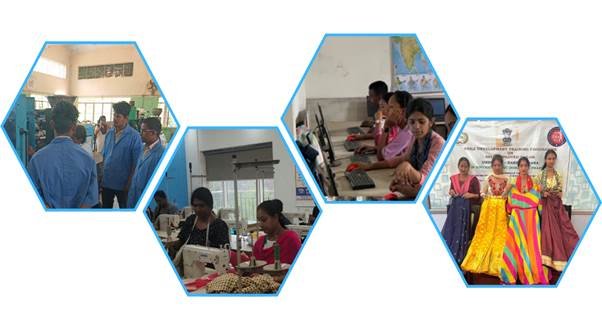
National Action Plan Aims to Skill 169,300 persons from Marginalized Community till 2025-26
Posted On: 08 AUG 2024 3:25PM
Introduction
PM-DAKSH (Pradhan Mantri Dakshta Aur Kushalta Sampann Hitgrahi) Yojana is a National Action Plan designed to skill marginalized communities. This scheme focuses on Scheduled Castes (SCs), Other Backward Classes (OBCs), Economically Backward Classes (EBCs), De-Notified, Nomadic, and Semi-Nomadic Tribes (DNTs), as well as sanitation workers including waste pickers.
Launched by the Ministry of Social Justice and Empowerment in 2020-21, the central sector scheme is entering its fifth year of implementation with an aim at enhancing the skills of these groups to improve their employability in both self and wage employment opportunities, thereby supporting their socio-economic development.
Objective of the initiative
The primary objective of the scheme is to elevate the skill levels of the target youth by offering both long-term and short-term training programs.
Additionally, the scheme aims to enhance the skills of artisans through Recognition of Prior Learning (RPL) programs. These programs focus on the skill certification component to enable targeted youth to take on industry-relevant skills.
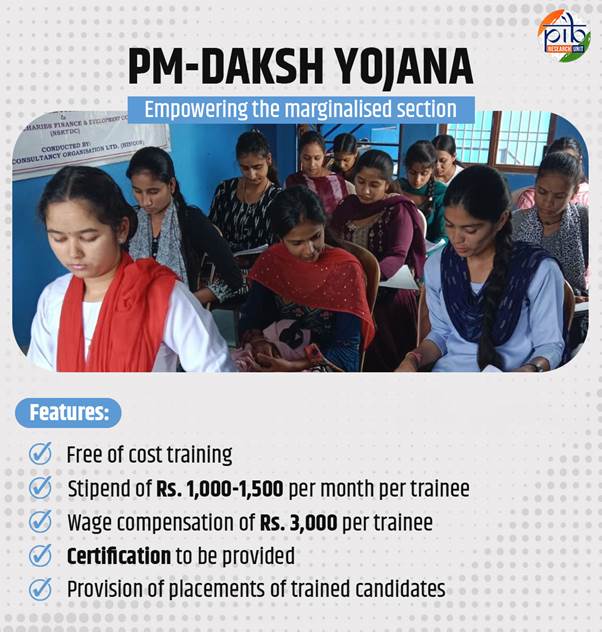
To achieve this, the scheme employs a multi-pronged strategy designed to improve the competency levels of the target groups, making them more employable. This approach supports the socio-economic development of the following sections of the target groups:
- Artisans: Enhance their revenue generation capabilities within their current vocations by upgrading their skills and processes.
- Women: Facilitate entry into self-employment, thereby empowering them financially while balancing their domestic responsibilities.
- Youth from the target groups: Provide long-term training and specialization in employable vocations, improving their competitiveness and prospects in the job market.
Under the scheme, any OBC and EBS candidates whose annual family income is less than Rs. 3 lakh and 1 Lakh respectively are eligible to get training whereas there is no income limit for the candidates belonging to SC/DNT/Safai Mitras including Waste Pickers. The age criterion of scheme between 18-45 years
Empowering the underprivileged
Between 2020-21 to 2022-23, a total of 107,120 trainees received training, with 77,237 of them securing gainful employment. The total expenditure on these training programs was Rs 127.95 crore.[1] For 2023-24, the program aimed to train around 53,900 trainees.
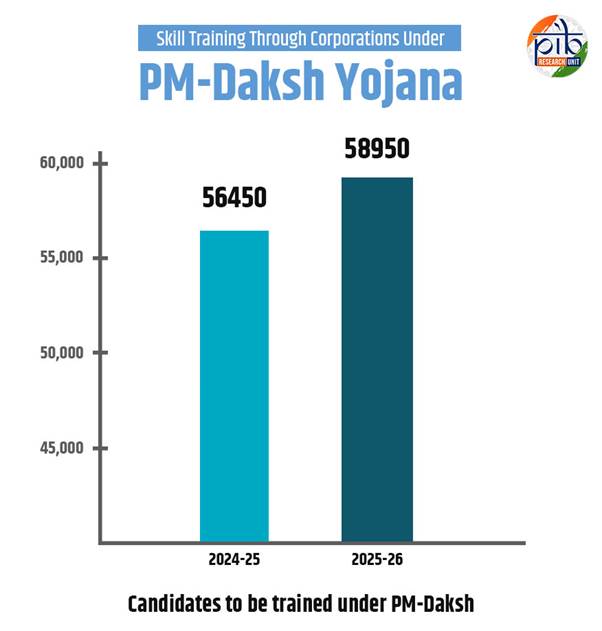
Notably, for the years 2024-25 and 2025-26, the initiative is projected to train about 56,450, and 58,950 trainees respectively. [2]
Further, the projected expenditure for these training programs is Rs 286.42 crore till 2025-26.
Skilling Programmes under PM-Daksh
- Up-Skilling and Re-Skilling
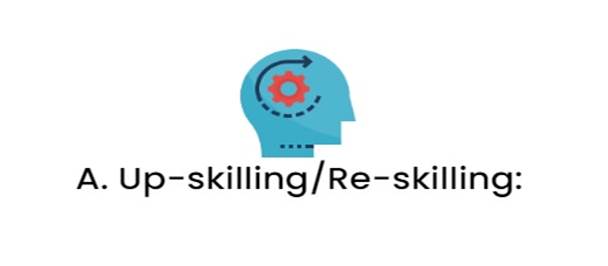
The training program for rural artisans, domestic workers, sanitation workers, and others covers various vocations such as pottery, weaving, carpentry, waste segregation, and domestic work, as well as financial and digital literacy.
Duration: The training sessions range from 32 to 80 hours, spread over a period of up to one month.
Cost: Training expenses will adhere to Common Cost Norms, with an additional Rs. 2,500 provided to trainees as compensation for wage loss.
- Short Term Training (Focus on wage/Self -employment)
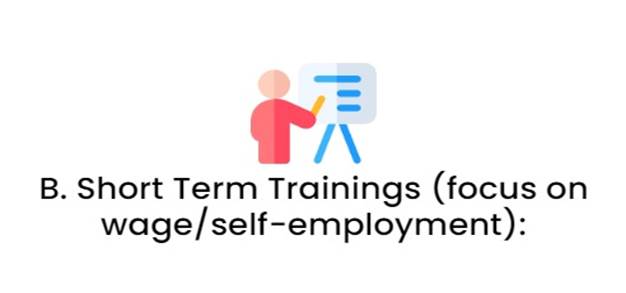
The training program aligns with the National Skill Qualification Framework (NSQF) and National Occupational Standards (NOS) issued by the Ministry of Skill Development and Entrepreneurship (MSDE).
It focuses on both wage and self-employment opportunities, including roles such as self-employed tailors, furniture makers, and food processors, as well as providing financial and digital literacy.
Duration: Typically, the training spans from 200 to 600 hours, and can extend up to 6 months, by the National Occupational Standards (NOS) and Qualification Packs (QPs).
Cost: Training costs will adhere to Common Cost Norms, with a stipend provided to trainees for non-residential programs.
- Entrepreneurship Development Programs (EDP)
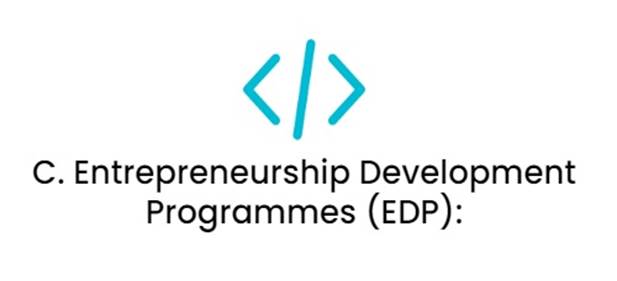
The training program is designed for SC and OBC youth who have preferably completed skill training under the PMKVY and have an entrepreneurial mindset.
Curriculum: The training will be based on programs implemented by the Ministry of Rural Development (MoRD) and delivered by organizations such as RSETIs, NIESBUD, IIE, and similar institutions.
The curriculum will include sessions on Business Opportunity Guidance, Market Survey, Working Capital and its Management, Business Plan Preparation, and more.
Duration: Typically, the training will last 80-90 hours (10-15 days), or as specified by MoRD.
Cost: Training expenses will follow the norms set by MoRD and Common Cost Norms (CCN).
- Long Term Training (Focus on wage/Self-employment)
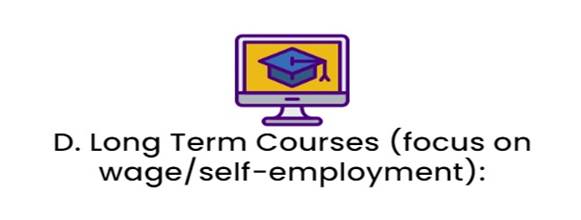
Long-term training programs are designed to address sectors with high demand in the job market, aiming for wage-placement of trained candidates.
Training Standards: Programs will adhere to the guidelines set by the National Skill Qualification Framework (NSQF), National Council for Vocational Training (NCVT), All India Council for Technical Education (AICTE), Ministry of Micro, Small, and Medium Enterprises (MSME), and other relevant bodies. Areas of focus include production technology, plastic processing, apparel technology, health care, and more.
Duration: The training will last 5 months or longer, typically up to 1 year (up to 1000 hours), as specified by the relevant board or regulatory body of the training center.
Cost: Training expenses will be by Common Cost Norms (CCN) or as stipulated by the concerned board. A stipend will be provided for non-residential programs.
Way Forward
The Government of India has been moving towards expanding its reach to cover more marginalized communities and remote areas, thereby increasing accessibility to skill development programs.
In Budget 2024, the focus was on employment, skilling, and the middle class. Notably, the Prime Minister’s package includes five schemes aimed at providing employment and skill development opportunities for 4.1 crore youth over the next five years, with a central allocation of Rs 2 lakh crore. This year alone, Rs 1.48 lakh crore has been earmarked for youth skilling and employment. These mega programs will expand the reach to beneficiaries, maximizing impact and inclusivity.
References:
- https://pmdaksh.dosje.gov.in/
- https://socialjustice.gov.in/public/ckeditor/upload/16321688727253.pdf
- https://www.pmdaksh.dosje.gov.in/aboutus
